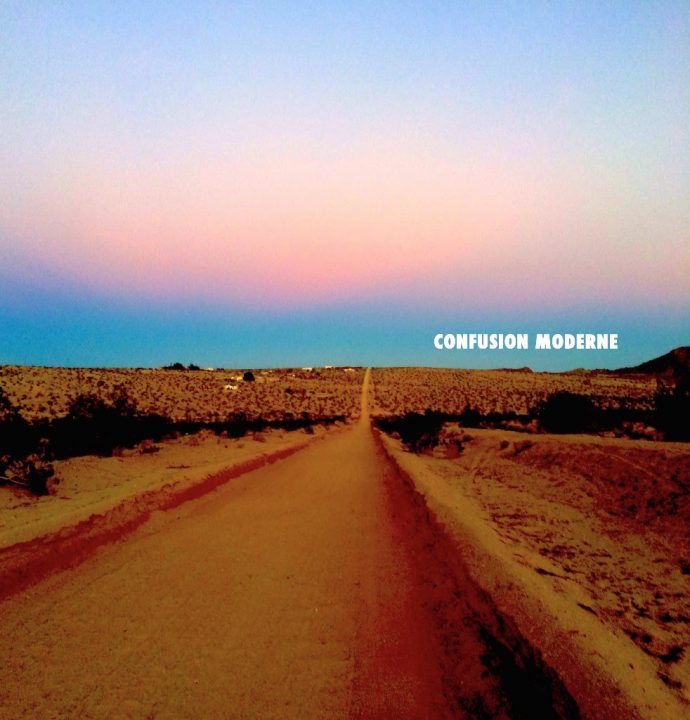There are some things that French-as-a-second-language classes don’t prepare you for, like DTCV’s mostly-French Confusion Moderne. Apparently the lyrics are about feminism, environmentalism, and the imminent fall of capitalism, but there was no vocabulary unit on these things in my classes. If you’re reading this, odds are that you’re not a Francophone, so you may also miss a lot of the political messages; you’ll still get to enjoy a fun garage rock/post-punk/indie-pop/‘60s-girl-group pop album. It’s a genre smorgasbord over here, with each song including a slightly different mixture of styles. This is the fifth album from the Joshua Tree, California-based duo. Fun fact: Lola G. and James Greer live like hermits in the Mojave desert, which might give you some context for this album. They walk the talk: they do live on the outskirts of society.
French is frontwoman Lola G.’s native tongue, so she made the decision to write nearly every song en français. As if translating political ideas in your under-used second language weren’t tricky enough even with clearly spoken words, some of the songs have that garage rock hallmark of nearly drowning out vocals with distortion and fuzzy guitars. The band has plenty of French-speaking fans who know what’s going on despite the fuzz, despite my wondering whether anyone was supposed to understand some of the fuzzy songs. We are meant to get it and the videos help to bring the point home. The video for “Capital ennui” features detailed shots of peeling paint, broken glass, and piles of garbage. You get the impression that society is broken. “Bourgeois Pop” has a very DIY video, but it’s much shinier than the dilapidated shots of “Ennui;” that’s because it was filmed in a very tidy Dollar Tree store, a Walmart parking lot, and an unidentified grocery store. Lola G. just wags her finger in front of mass produced products and processed foods, again signaling that she doesn’t agree with society.
It’s a strange juxtaposition to have some really happy, 60’s-sounding pop songs that are covering all of society’s ills. “Bourgeois Pop” and “Impossible (Yeah)” are very vintage pop, with the former including handclaps and the latter featuring a slight surf sound. This album does have some punk edge on “Conformiste” and “We Are Not the Champions,” the one English-language song and the only one where James Greer takes the lead vocals (on the verses, Lola is back for the choruses.) “Champions” is mostly spoken and angry; the tone matches the lyrics about burning down the not-so-nice parts of society. “Capital ennui” is pretty while delivering lyrics with an almost robotic style to match the automatic way we move through life described in the lyrics, or perhaps automatic acceptance of a capitalist and patriarchal society. “L’accord parfait” and “Soleil 2666” are really soft, pretty songs, stripped down to very minimal instruments. If my French knowledge isn’t failing me, I think “L’accord parfait” is about a great relationship that she’s found and doesn’t want to lose, it’s a sweet sentiment and a sweet sound, which is a weird mix with some of the other, angrier songs. “Soleil 2666” sounds like a perfect slow dance. Despite it being a slow burn, it’s still hard to make out all of the lyrics on “Soleil 2666” because the big, slow, lumbering guitar chords drown out the delicate vocals. It’s this weird mix of clunky and fine that works well together (as long as you’re not trying to translate lyrics.)
Even if you can’t understand what they’re saying, this is a pretty garage rock/post-punk/indie-pop/‘60s pop album. Lola G.’s vocals keep it sweet, the secret French messages keep it edgy. There’s quite a mix of really sweet, upbeat pop and darker garage rock, but it’s all tied together and kept cohesive by Lola G.’s vocals, the one uniting thread between it all. It’s a catchy album, no matter what language you speak.
Rating: 6.9/10

